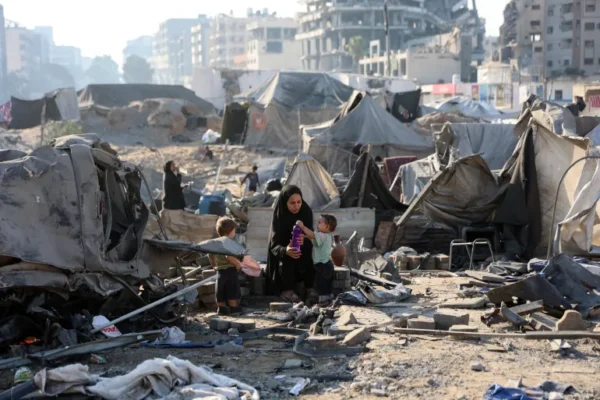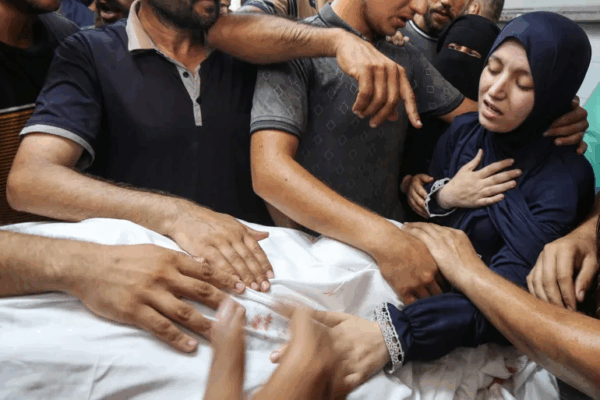Medicide is a central part of Israel’s goal of making Palestinian life in Gaza impossible. Palestinians react over bodies as they mourn doctor Marwan al-Sultan, director of the Indonesian Hospital in northern Gaza Strip, his wife, his daughter and and his sister, who were killed in an Israeli strike on Wednesday, according to Gaza’s health ministry, at Al-Shifa hospital in Gaza City, July 2, 2025.Lubnah al-Sultan mourns her father Marwan al-Sultan, director of the Indonesian Hospital, killed by the Israeli army, in Gaza City, on July 2, 2025After her parents, sister and husband were killed in a bombing, Lubnah prayed they would be the last victims of the war. Her father, Dr Marwan al-Sultan, was one of Gaza’s most respected medics, director of the Indonesian Hospital, and one of only two surviving cardiologists in the Strip. On July 2, an Israeli bomb killed him, alongside his wife Dhikra, their daughter Lamees, his sister Amneh, and his son-in-law Mohammed, Lubnah’s husband. The family had been sheltering in an apartment, in an area designated by Israel as “safe”, having evacuated their home in Jabalia in compliance with orders from the Israeli occupation forces (IOF). The so-called “Chalet area” of western Gaza City was once a place where families spent time at the beach, enjoying themselves, despite the daily trials of Israeli occupation. The bomb targeted directly the room Dr Marwan was sitting in; no other part of the building was destroyed. Lubnah survived because she had gone downstairs to prepare food. Her brothers, Omar, Ahmad and Nimr also survived because they were outside the home. The day before his death, upon hearing the news of a possible ceasefire, Dr Marwan shared a hopeful vision with his son, Omar. “The first thing we’ll do [once a ceasefire is reached] is go back home. With everyone’s effort, in a month or two, we can make it as before. Then we’ll rebuild the hospital,” he said. Omar felt inspired by his father. His daughter Lubnah’s prayers were not answered. The genocide continued taking victims. On July 4, another doctor was murdered: Dr Musa Hamdan Khafaja – a consultant in obstetrics and gynecology in Nasser Hospital. The attack was eerily similar. Dr Musa had also followed the orders of the IOF, fled his home in Khan Younis, and sought refuge in al-Mawasi, another “safe zone”. There, he pitched a tent to shelter his family. That tent became their grave. His wife and three young children – daughters Shaza and Judi, and son Adel, all died. The only survivor was his son Amr. Both men had dedicated their careers to saving the lives of others, staying with their patients through bombings and sieges on their hospitals. Dr Marwan was the 70th healthcare worker killed in the previous 50 days; Dr Musa became the 71st. Their deaths bring the total number of medical personnel killed since October 2023 to at least 1,580, according to the Government Media Office in Gaza. Every two days since the war began, Israel has killed five medical personnel, that is 16 doctors, nurses, ambulance technicians or other healthcare workers, per week. Among those murdered since the genocide began are Gaza’s most distinguished medical minds. They include Dr Omar Farwana, former dean of the Faculty of Medicine at the Islamic University of Gaza; Dr Rafat Lubbad, director of Hamad Hospital for Artificial Limbs; Dr Soma Baroud, prominent obstetrician-gynaecologist; Dr Ahmed al-Maqadma, a prominent reconstructive surgeon; Dr Sayeed Joudeh, the last orthopaedic surgeon in northern Gaza; Dr Adnan al-Bursh, head of orthopaedic surgery in al-Shifa Hospital; and Dr Iyad al-Rantisi, head of a women’s hospital in Beit Lahiya. Dr Soma and Dr Sayeed were killed on their way to work. Dr Adnan and Dr Iyad died under torture in Israeli detention. More than 180 are in Israeli detention centres, including Dr Hussam Abu Safia, the director of Kamal Adwan Hospital, who has been detained since December 2024. Medical infrastructure – protected under international humanitarian law – continues to be a primary target. The World Health Organization has documented 734 such attacks since the war began. Hospitals have been turned into graveyards. This is not collateral damage; this is medicide – the deliberate destruction of Gaza’s capacity to live. Each murdered doctor represents the loss of years of training, commitment and the potential to save lives. Each bombed hospital is the dismantling of Gaza’s capacity to heal itself, to survive, to endure. These are not just lives lost; they are futures destroyed. This is the reality in Gaza right now. It has little to do with Israel’s declared military objectives of eliminating the Islamic resistance movement – Hamas – or securing the return of the captives taken on October 7, 2023. Rather, it is what I termed al-Ibādah – the Destruction. Al-Ibādah is the comprehensive annihilation of a people’s social, cultural, intellectual and biological continuity – a process of total erasure. And exterminating medical workers is a key element of it. Before he was killed, alongside her father, Lubnah’s husband, Mohammed – a journalist for Palestine Magazine – endured one and a half years’ imprisonment in Israel. Upon his release, he confided to Lubnah that death would have been preferable to the horrors he had witnessed behind bars. His confession shook her deeply. Today, Lubnah’s prayer is heartbreakingly simple: “Enough. Enough, stop this war.” But so far, like her other prayers, this one is also going unanswered.





